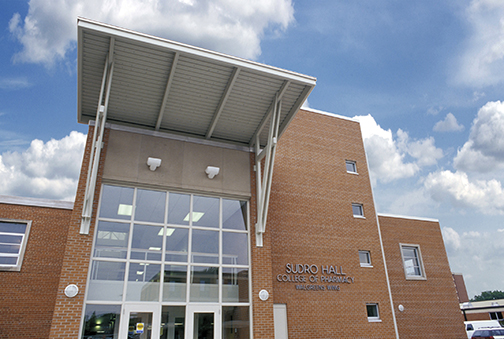Radiologic Sciences
A Bachelor of Science degree, major in Radiologic Sciences (RS), at North Dakota State University, combines foundational sciences, math, and general education courses on campus with applied imaging classroom, lab and clinical experience during a two-year, full-time internship within an affiliated hospital. Three unique and specialized internships available to RS majors at NDSU are radiography, diagnostic medical sonography, and echocardiography.
RS students complete two or more years of rigorous college courses on campus followed by a two-year, full-time professional-level internship within a hospital-based program affiliated with NDSU. RS students must have an interest and aptitude in the sciences and math and a strong desire to work directly with patients. Students pursuing any one of the three RS specializations will complete the same pre-radiologic sciences college courses. These courses include chemistry, physics, anatomy and physiology, microbiology, trigonometry, psychology, computer science, and statistics, in addition to general education courses. During the final year of pre-RS courses on campus, qualified students will apply for the two-year internship. College courses and the internship classes, lab, and clinical education constitute the four-year degree awarded by NDSU.
The internship application process begins annually in the fall. Admission into the internship is competitive. Specific admission criteria is established in collaboration with each affiliated hospital program and generally includes successful completion of pre-requisite college courses with a minimum grade of C, grade point averages (a minimum of 2.50-3.00 is required and varies by hospital program), references, related experience, an interview, and compliance with criminal background and student conduct requirements. Students admitted into the internship must possess the ability to meet program-designated technical standards or request reasonable accommodations to execute these skills. Technical standards include a sound intellect and emotional health to exercise good judgement even in emergencies, visual and hearing acuity, physical ability to lift and position patients, pull, push, and carry equipment, enter data, stand and walk for extended periods of time, and communicate effectively. The internship focuses on didactic and clinical education that prepares the graduate to work in their respective discipline of radiography, diagnostic medical sonography, or echocardiography.
Radiography
Radiographers, also known as radiologic technologists, perform diagnostic imaging examinations, accurately position patients, obtain quality diagnostic images, and adhere to radiation protection regulations for themselves, their patients, and coworkers. They work closely with radiologists, the physicians who interpret medical images, to diagnose or rule out disease or injury. Radiologic technologists work in hospitals, physician offices and clinics, and diagnostic imaging centers. With experience and additional training, general radiographers may specialize in CT, mammography, magnetic resonance imaging, or interventional radiography, or advance into management and education. According to the U.S. Department of Labor Bureau of Labor Statistics, employment of radiologic technologists is expected to grow faster than average for all occupations through 2026.
RS students who apply and are accepted into the two-year radiography internship will complete their applied classroom and clinical education in one of the hospital-based radiologic technology programs with which the Department of Allied Sciences affiliates. These hospital-based programs are: Avera McKennan Hospital (Sioux Falls, SD), Mercy/St. Luke's Hospitals (Cedar Rapids, IA), Sanford Health (Bismarck and Fargo, ND, Sioux Falls, SD), St. Cloud Hospital (St. Cloud, MN), St. Luke's College (Sioux City, IA), UnityPoint Health (Des Moines, IA), and the Veteran Affairs Medical Center (Minneapolis, MN). Affiliated hospital programs maintain programmatic accreditation through the Joint Review Committee on Education in Radiologic Technology (JRCERT). The internship classes and clinical education will focus on patient care, anatomy and physiology, patient positioning, imaging principles, and radiation safety and protection. Graduates are eligible to take the national certifying exam administered by the American Registry of Radiologic Technologists (ARRT). NDSU graduates have enjoyed excellent pass rates on the ARRT exam.
Sonography
Sonographers use special equipment and high frequency sounds waves (ultrasound) to obtain images of internal body structures and organs. They have a high level of patient interaction and play a vital role in providing the physician with diagnostic images to interpret and assess medical conditions or conduct surgical procedures. Sonographers work in hospitals, physician offices, and medical and diagnostic labs. Currently, there are job opportunities throughout the region and country. According to the U.S. Department of Labor Bureau of Labor Statistics, demand for sonographers continues to grow faster than average for all occupations through 2026. Two options for NDSU students interested in sonography are echocardiography and diagnostic medical sonography.
Echocardiography
Echocardiographers, also known as cardiac sonographers, evaluate the anatomy and hemodynamics (blood flow) of the heart, its chambers and valves, and related blood vessels. RS students who apply and are accepted into the echocardiography specialization will complete their applied education during a 21-month internship offered through Sanford Health, Fargo, ND. Internship classes, scanning labs, and clinical experience will focus on anatomy and pathophysiology, examination techniques, equipment operation and protocols, and patient care and safety in adult echocardiography with rotations in pediatric and stress echo.
Diagnostic Medical Sonographers
Diagnostic medical sonographers evaluate abdominal structures like the kidney, liver, and spleen, breast tissue, the reproductive system, blood vessels, fetal development, and musculoskeletal structures like tendons and joints. RS students who apply and are accepted into the diagnostic medical sonography specialization will complete their applied education during a 21-month internship offered through Sanford Health, Fargo, ND. Internship classes, scanning labs, and clinical experience will focus on anatomy and pathophysiology, examination techniques, equipment operation and protocols, and patient care and safety in the diagnostic imaging of abdomen, OB/GYN, small parts, and vascular sonography.
Information about the RS profession and specializations, curriculum, internship, and advising contacts are available from the Department of Allied Sciences. It is highly recommended that students interested in the Radiologic Sciences major meet with the RS advisor at least one year prior to anticipated internship application to discuss degree requirements, RS specialization, internship admission, and create an individualized plan of study for successful completion of degree requirements.

